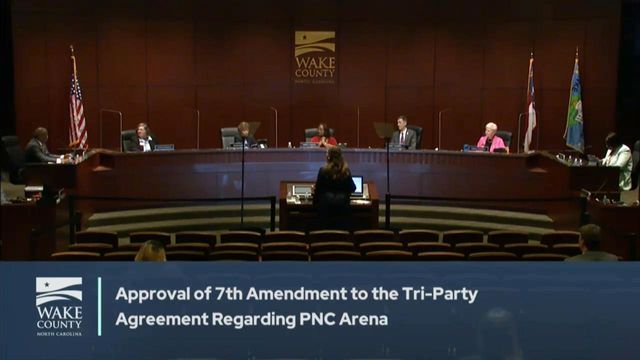Federal inquiry opened after allegations of antisemitic remarks at UNC-Chapel Hill

The U.S. Department of Education is investigating UNC-Chapel Hill’s response to antisemitic remarks on campus.
The inquiry follows a complaint filed by a Triangle attorney who highlighted two events: A UNC professor’s “troubling” comments about Israel during an October class and a November speech given by an invited speaker at a campus roundtable who called the Oct. 7 Hamas attacks on Israelis “a beautiful day.”
Campus leadership has already condemned the November speech, but a flier advertising the event indicated multiple campus professors would attend, implying “UNC approval of the offensive statements,” David Weisberg wrote in his complaint.
The university said in a statement that it’s aware of the complaint, that it will cooperate fully with an investigation and that leaders remain “committed to promoting a safe and equitable environment to all members of the Carolina community that is free from harassment and discrimination.”
The Department of Education’s Office for Civil Rights opened its inquiry Dec. 22, about two weeks after Weisberg sent his complaint. The office said in a response letter that Weisberg provided to WRAL that “opening an investigation in no way implies that OCR has made a determination on the merits of the complaint.”
“OCR will investigate the following issue,” the letter states. “Whether the university responded to alleged harassment of students based on national origin (shared Jewish ancestry) in a manner consistent with the requirements of Title VI.”
Title VI is part of the Civil Rights Act of 1964, and it says no one can be discriminated against by a program receiving federal funding, as UNC and other universities do.
In addition to the October and November incidents, Weisberg’s complaint lays out concerns from 2019, when antisemitic fliers were distributed two weeks after an on-campus conference on conflict in the Middle East. The conference featured a rap performance many described as antisemitic.
Complaints filed at the time produced a resolution agreement between the university and the Office for Civil Rights. UNC-Chapel Hill didn’t admit any violations, but the university agreed to several steps, including anti-harassment training and listening sessions with campus administrators.
“The fact that the resolution agreement was signed more than four years ago indicates that antisemitism at UNC is a persistent problem that in fact has not been resolved,” Weisberg wrote in his complaint.
Weisberg said that, in October, a UNC assistant professor told a UNC class that Israel and the United States don’t care about international law or war crimes and that Israel’s existence is “somewhat ridiculous.” The professor also called Israel “a clearly fascist state committing a genocide under the guise of it supposedly being the only democracy in the Middle East,” Weisberg said in his complaint, which linked to coverage of the remarks.
In November, two UNC departments hosted a roundtable on social justice in Palestine, Weisberg said in his complaint. An invited speaker, who does not work for the university, told attendees that “Oct. 7, for many of us from the region, was a beautiful day,” referring to attacks that killed some 1,200 people and ignited the latest round of fighting in Israel and Gaza.
Weisberg linked to a minute-long audio recording posted online by a pro-Israel group. The clip ends with the speaker calling for “the eradication of Zionism” so displaced Palestinians can return to lands they held before the State of Israel was established in 1947.
UNC-Chapel Hill Chancellor Kevin Guskiewicz, who recently announced plans to leave the university for another job, released a statement shortly after this event, saying he was “appalled by the remarks.”
WRAL News’ attempts Friday to reach the November speaker, as well as the UNC professor identified in the complaint, were not successful.
Weisberg said the October and November incidents were “clear instances of antisemitic statements either by UNC faculty members in their capacity as classroom teachers or by non-faculty persons in a setting that would nevertheless reasonably imply UNC approval of the offensive statements.”
“When on-campus events hosted by UNC academic departments feature speakers who broadcast blatantly anti-Zionist, antisemitic remarks, Title VI and the [2019] resolution agreement again are both plainly violated,” Weisberg said.
UNC said in its statement Friday that campus leaders “are directly engaging with groups and individuals across campus to provide conversation and support with those most affected by events in the Middle East.”
“These conversations have been vital to listen, learn and make sure all students, faculty and staff can share their concerns and know about available resources and services,” the university said.
UNC’s press office also noted recent public statements from campus leaders, including a Dec. 15 statement from the dean of the College of Arts and Sciences condemning the November remarks and promising discussions with department chairs as students return to campus next month about “expectations for departments when organizing future events.”
As for the federal investigation, it’s one 86 active inquiries of this type that the U.S. Department of Education lists for K-12 schools or colleges around the country.
The cases go back as far as 2016, but President Joe Biden’s administration has said it stepped up efforts in recent months “to address the alarming nationwide rise in reports of antisemitism, anti-Muslim, anti-Arab, and other forms of discrimination and harassment on college campuses and in K-12 schools since the October 7 Israel-Hamas conflict.”










